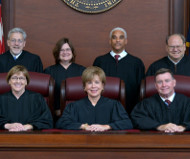Article from: www.thenewspaper.com/news/45/4582.asp
12/3/2014
Missouri Supreme Court Tests Photo Enforcement Word Games
Judges of the Missouri Supreme Court hear oral arguments in a trio of cases on the legality of automated ticketing machines.
 The Missouri General Assembly never gave cities and counties permission to install either speed cameras or red light cameras, but dozens of localities refused to wait for a legislative green light. They hired American Traffic Solutions to install and operate automated ticketing machines against the advice of the photo enforcement firm's own legal counsel (view legal memo). On Tuesday, the state Supreme Court considered the word games localities have been forced to play to evade the legal dangers ATS lawyers identified.
The Missouri General Assembly never gave cities and counties permission to install either speed cameras or red light cameras, but dozens of localities refused to wait for a legislative green light. They hired American Traffic Solutions to install and operate automated ticketing machines against the advice of the photo enforcement firm's own legal counsel (view legal memo). On Tuesday, the state Supreme Court considered the word games localities have been forced to play to evade the legal dangers ATS lawyers identified.
In the Brennan case, the city of Moline Acres claims that red light running and speeding tickets issued by machine are not moving violations, because the driver must be positively identified for such violations under state law. The city argues that the rules for parking tickets apply because photo citations are not moving violations, but citations for "unsafe supervision" -- the failure to ensure that someone would not take the car and use it for unsafe driving. Some of the high court judges were skeptical.
"But counsel, it's not 'unsafe supervision' of your vehicle to permit the vehicle to be operated at a rate of speed in excess of the posted speed limit," one judge argued. "So it's permitting it to be used to speed. If the court doesn't buy that reading, do you lose, or do you have a backup argument?"
Another judge pointed out under the city's reasoning that two tickets could be issued for one alleged offense. One ticket goes to the vehicle owner for unsafe supervision and the other to the driver for speeding.
"It's certainly theoretically possible," Carl J. Lumley, the attorney for Moline Acres, admitted.
St. Louis attorneys Hugh A. Eastwood and W. Bevis Schock argued against photo ticketing in the three cases. Judge Richard B. Teitelman suggested some forms of owner liability are recognized under the law. He posed examples of homeowners who are held responsible for the condition of their property, even though they may not be personally responsible for overgrown grass or dilapidated conditions. Eastwood countered by citing court precedent that showed the individuals must be given a chance to remedy the defect before a fine can be imposed.
"In those cases, the criminal conviction was thrown out for nuisance because there was no proof the owner had actual or constructive notice of the violation," Eastwood argued.
In the Tupper red light camera case, judges were concerned that by creating a "quasi-criminal" violation ordinance, the city of St. Louis could jail the owner of a vehicle for a crime that he did not necessarily commit.
"It's conceivable," St. Louis city attorney Michael Garvin admitted. "Municipal judges are the ones who set the maximum penalty by court order."
Garvin argued that it is reasonable for St. Louis to presume the owner should receive the citation because in traffic stops, 70 to 80 percent of the time that the registered owner is behind the wheel. The anti-camera attorneys disagreed.
"Whether the presumption is a lawful presumption to make, in my view, depends on the kind of case it is," Schock said. "My argument is simple. Seventy to eighty percent is not enough to make the presumption reasonable. We would capture too many people with the receipt of a notice of violation, and that's simply not lawful under the due process requirements."
One of the judges decided to help clarify Schock's argument on this point.
"You can't convict someone based on statistical livelihood," she said. "You have to have particularized evidence."
 The Missouri General Assembly never gave cities and counties permission to install either speed cameras or red light cameras, but dozens of localities refused to wait for a legislative green light. They hired American Traffic Solutions to install and operate automated ticketing machines against the advice of the photo enforcement firm's own legal counsel (view legal memo). On Tuesday, the state Supreme Court considered the word games localities have been forced to play to evade the legal dangers ATS lawyers identified.
The Missouri General Assembly never gave cities and counties permission to install either speed cameras or red light cameras, but dozens of localities refused to wait for a legislative green light. They hired American Traffic Solutions to install and operate automated ticketing machines against the advice of the photo enforcement firm's own legal counsel (view legal memo). On Tuesday, the state Supreme Court considered the word games localities have been forced to play to evade the legal dangers ATS lawyers identified.